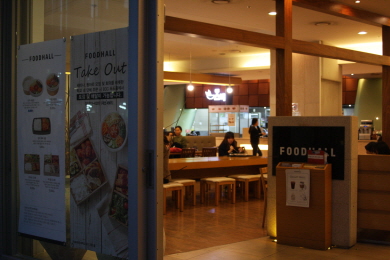
Since the completion of the ECC in 2008, the school has been exempted from property tax on the building as it was originally constructed for educational purposes. However, the school changed the function of ECC’s basement fourth floor in 2010 and has rented it to outside businesses including a cinema, a franchise cafe, and restaurants. As the university has acquired rent by lending its property, Seodaemun-gu imposed four years worth of property tax (2010-2014) regarding the basement fourth floor last year.
“We are planning to tax areas of the ECC that are used for commercial purposes,” said Jung Ju-hong from the Revenues Division of the Seodaemun-gu Office.
The court declared that Ewha should pay property tax for all facilities located on the basement fourth floor of the ECC except for the two research institutions: Fashion Design Research Institute and Ewha Research Institute for Translation Studies.
After the court’s initial decision, Seodaemun-gu appealed to the Seoul High Court on Sept. 22, asking for tax imposition on the entire basement fourth floor. The court is currently examining documents submitted by both sides.
Meanwhile, Ewha maintains that taxation on property used for student welfare is unjust and plans to appeal to the Supreme Court if necessary.
“The rent acquired from the complex is used for students,” said Kim Dae-in from the Office of University Planning and Coordination. “The university opposes taxation on facilities that students frequently use.”
The recent court decision against Ewha has implications for other universities that have been exempt from property tax while acquiring rent from commercial facilities. Currently, there is an average of nine outside businesses located within campus buildings in Seoul, with 39 at Seoul National University, 23 at Hanyang University, and 22 at Korea University. Despite collecting rent from outside businesses, schools have been free from taxation, as the facilities were considered to promote student welfare.
For example, Yonsei University pays property tax only for its hospital and commercial facilities in the College of Engineering. Similarly, Hanyang University is exempt from taxation except for the cafeteria and the funeral home at its hospital.
Although commercial property on campus has been exempt from tax under the name of student welfare, students claim that there is a lack of space for students. In fact, students of Yonsei and Ewha have protested against the construction of commercial venues on campus.
In 2013, a student-led organization at Yonsei named “Make Baekyang-ro With Us” demanded that the school add more student facilities to the campus complex at Baekyang-ro. It also opposed the construction of the massive parking lot in the building as it would not be used by students. Similarly, Ewha’s student government also protested, with little success, against the construction of the ECC.
Amid the growing conflict between schools and local authorities regarding the taxation of commercial venues on campus, students showed mixed views on the necessity of commercial establishments.
“The proximity of private amenities on campus makes them convenient for students,” said Shin Yu-lim, a sophomore majoring in Economics.
However, some believed that commercial facilities on campus do not promote student welfare and remarked that little revenue is used for students.
“Many commercial establishments at Ewha are targeted at foreign tourists instead of students,” said Choi Da-un, a sophomore majoring in English Education. “Also, the establishments seem to be built primarily for school revenue.”
While some students are against campus commercialization, the court decision is expected to bring changes in other districts regarding taxation on campus commercial establishments.
“If the Supreme Court decides to tax even commercial venues that promote student welfare, we will impose property tax on additional commercial facilities at Hanyang University,” said an official from the Revenues Division at Seongdong-gu District Office.
For those perplexed about taxation on student welfare facilities that produce rent, the Seodaemun-gu Office referred to foreign examples.
“In the past, local districts had completely exempted universities from property tax to help them flourish,” Jung admitted. “However, universities abroad, such as those in the United Kingdom, pay taxes on revenue from profit-making businesses. It is now time to bring in changes to our campuses.”
Huh Ryun-jung
ryunhuh@ewhain.net

